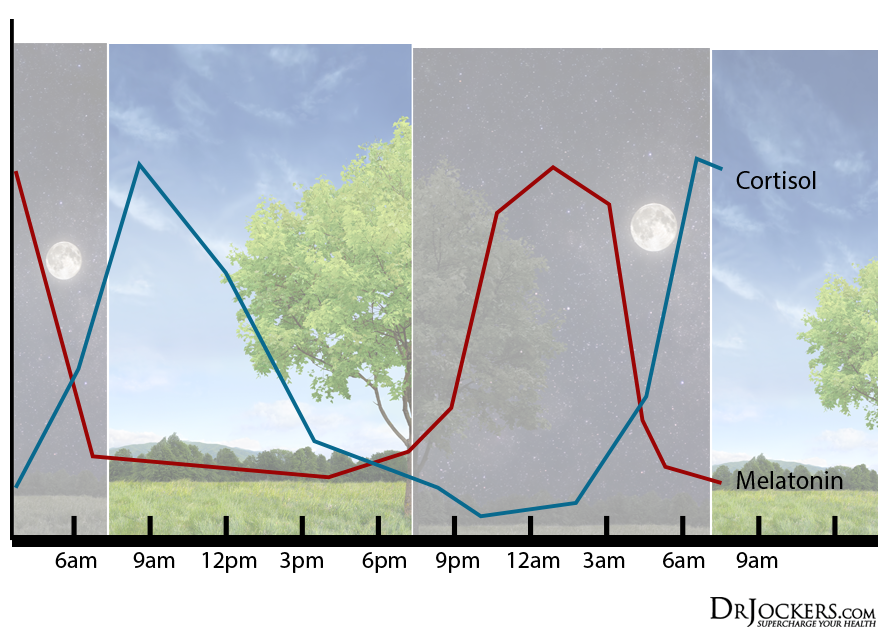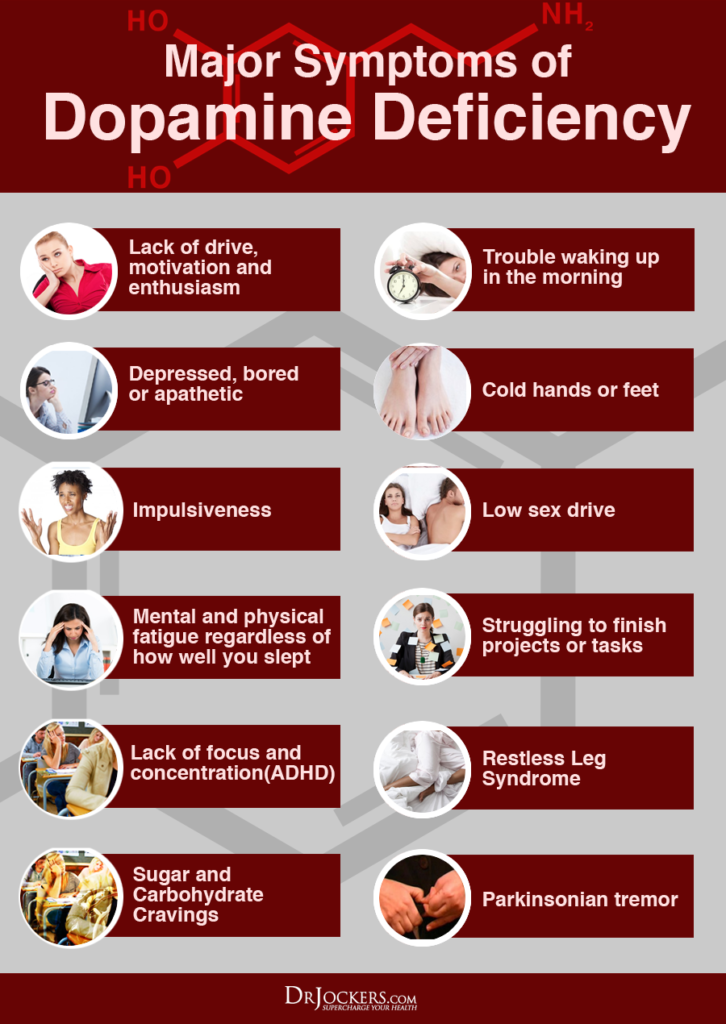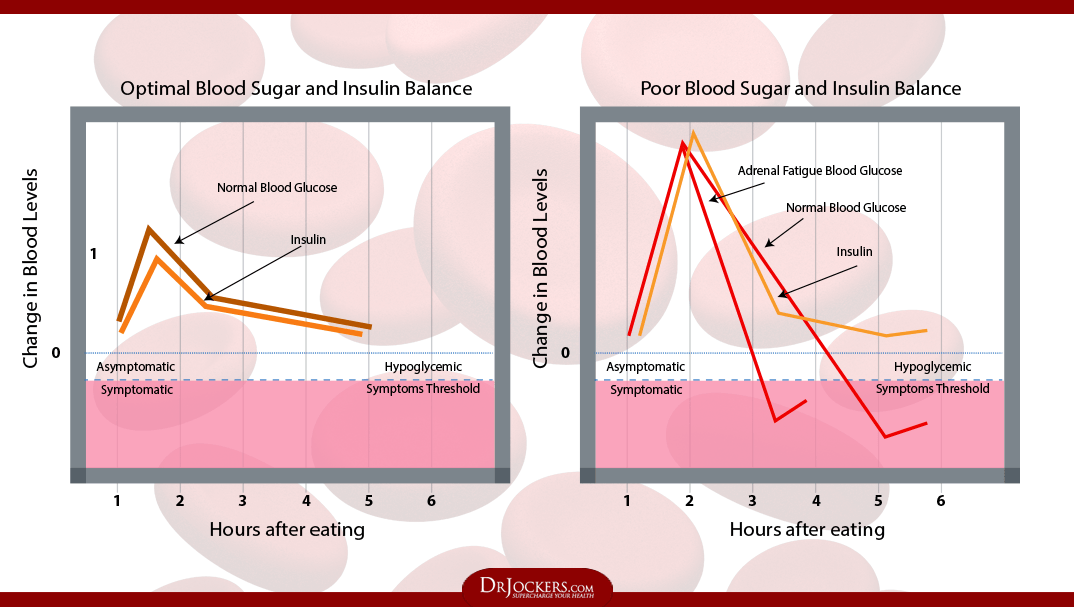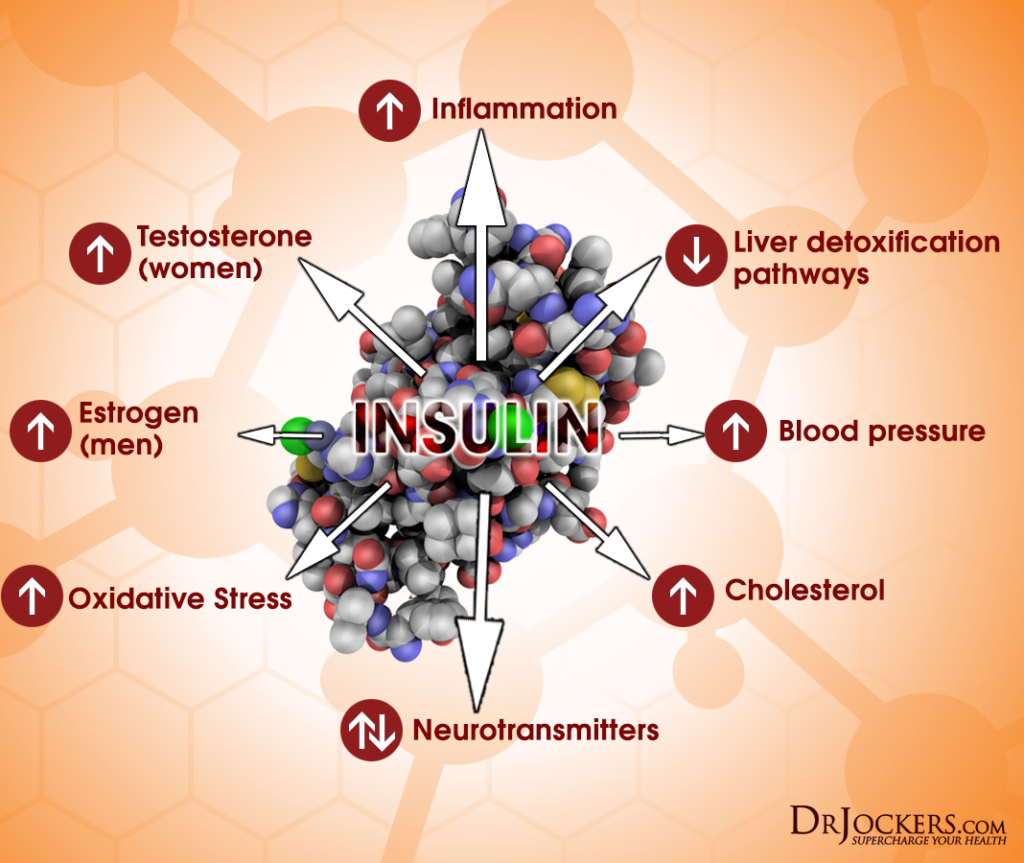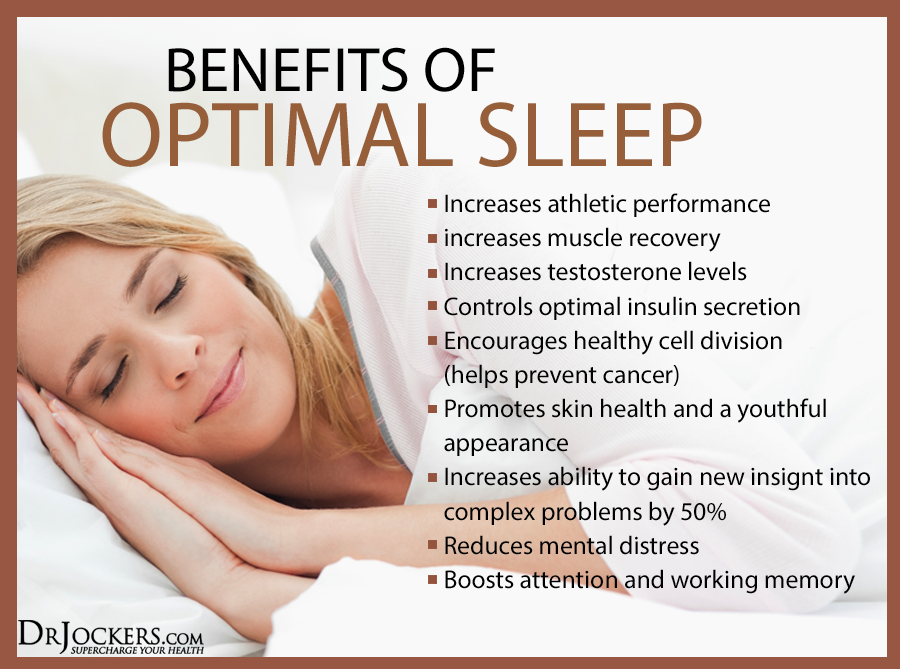 7 Key Sleep Benefits
7 Key Sleep Benefits
America is a fast-paced, 24-hour, hard-charging society. For some reason, we value working to the point of exhaustion, skipping sleep, and poor health habits as noble sacrifices for success. While our society has produced some game-changing thinkers and innovators, we also have increasingly elevated rates of almost every chronic disease on top of being one of the least happy populations in the world. What if the sleep benefits are just too valuable to pass up?
Although it may feel like you are actually getting more done by skimping on sleep for work, this is likely not the case. Especially if you consistently push yourself to sleep deprivation, you are likely compromising your quality of work and, more importantly, your quality of life. Getting consistent and high quality sleep will improve your productivity, your mood, and your overall vitality.

1. Stress Regulation
One of the most important reasons to get good sleep at night is the influence it has on your HPA axis. The HPA axis consists of your hypothalamus, pituitary, and adrenal glands. This system constantly monitors your body for stress feedback and helps determine how you should respond in a given situation. If you’ve ever experienced a rush of energy before doing something scary or exciting, then you have experienced the influence of your HPA axis.
The connection between sleep and HPA axis has been studied for some time and it has been found that lack of sleep can actually interfere with our ability to regulate stress (1). Poor sleep has been shown to throw off normal cortisol production and disrupt the HPA axis.
Getting consistent, high quality sleep will support a favorable cortisol rhythm during the night that will sooth the HPA axis and promote a healthy stress response. HPA axis dysfunction is one of the primary contributing factors to adrenal issues which can have a profoundly negative impact on the lives of those who have it.
2. Proper Memory Formation
Although there has not been an agreement on how exactly it occurs, a lot of research highlights the importance of sleep in forming memories (2). To back this up, there are also studies that have shown an improved ability to retain information when received before sleep (3).
It has been theorized that this nighttime memory consolidation is what allows for humans to have neuroplasticity. Neuroplasticity simply refers to the ability of the brain to build and rewire neural connections when we learn new things. This is part of what makes humans so adaptable.
If you think about it, the deeper ingrained a memory is in your brain, the easier it is to recall it. This essentially allows us to use less energy on recalling old information so that we can focus on learning new information. The brain accounts for about 20% of your body’s total energy expenditure so this adaptation is important (4)!
Another important mechanism by which sleep improves memory is by helping to optimize acetylcholine levels in the brain. Acetylcholine is a vital neurotransmitter in memory formation.
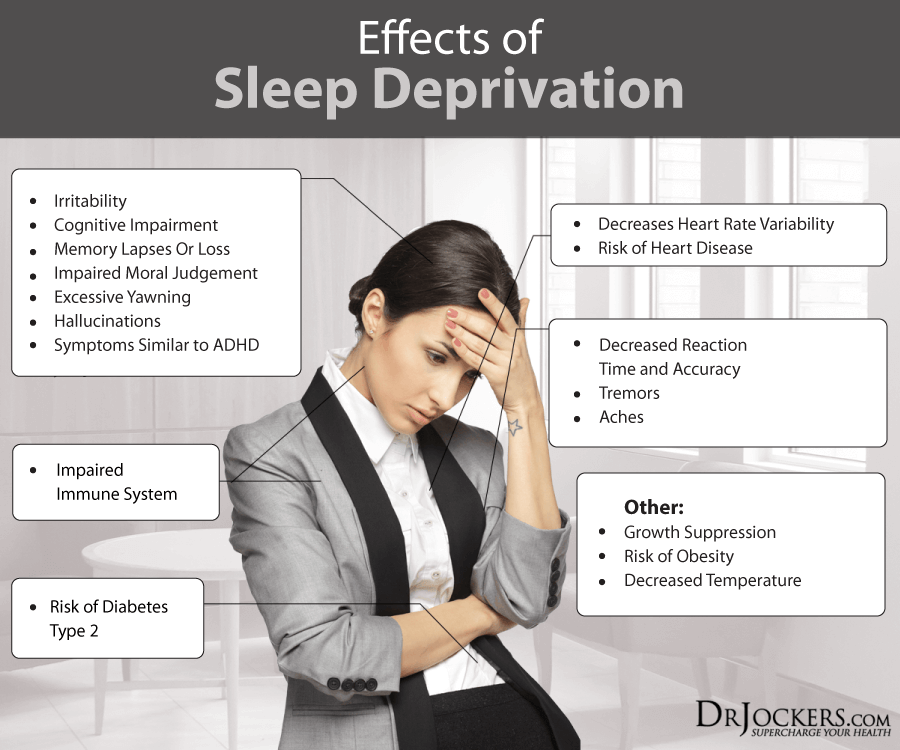
3. Sleep Benefits Motivation
The brain recycles and flushes neurotransmitters during sleep for a fresh start in the morning. One specific neurotransmitter, dopamine, is responsible for stimulating feelings of alertness and motivation.
One study observed a group of subjects and found a decrease in dopamine receptors in the brain after sleep deprivation (5). Without adequate receptor sites, dopamine cannot exert its full impact on the brain.
In this way, getting consistent, restorative sleep benefits your motivation and can actually help you maintain high energy throughout the day!
4. Sleep Benefits Diabetes Prevention
Although sugar regulation has a lot to do with your diet and physical activity, not getting enough sleep can cause some serious issues here.
A 2015 review of studies found that not getting enough sleep, getting fragmented sleep (such as with sleep apnea), or not getting quality sleep can all contribute to insulin resistance (6). Insulin resistance leads to blood sugar dysregulation which then increases your chances of obesity, inflammation, and hormone imbalances.
In combination with a good diet and proper physical activity, getting adequate sleep may serve an important role in diabetes prevention and blood sugar regulation.
5. Sleep Benefits Heart Protection
There are several ways that sleep can actually protect your heart and reasons why not prioritizing sleep could be a risk factor for some serious diseases.
First of all, poor sleep is associated with blood sugar dysregulation and poor eating habits (tendency to eat sugar particularly). Therefore its not surprising that poor sleep also increases your chances of becoming obese by up to 89% in some cases (7)! All of these peripheral effects of poor sleep will put unneeded stress on the heart.
On top of this, poor sleep has been shown to increase your chances of stroke and coronary heart diseases significantly (8).
Another reason poor sleep is bad for your heart is by increasing inflammation. The blood sugar dysregulation that occurs with poor sleep leads to higher insulin levels which drive up inflammation. The higher your inflammation levels in your body, the more likely you are to oxidize cholesterol into dangerous arterial plaques.
6. Sleep Benefits Brain Health
Contrary to what you might think, the brain is actually very active during sleep. When you fall asleep, the brain gets busy recycling and clearing neurotransmitters, circulating cerebrospinal fluid, and draining metabolic wastes that accumulate during wakefulness (9). This is one of the most profound sleep benefits.
The brain is a powerful organ but can also become quite delicate if not taken care of. The draining of metabolic wastes, I think, is one of the most crucial activities during sleep that protects brain health. Operated by what has recently been named the glymphatic system, this clearing of metabolic waste protects the brain’s ability to make energy.
Mitochondria (the energy makers of our cells) are highly concentrated in brain cells. This makes sense given how much energy the brain requires to function. A byproduct of energy production is the formation of free radicals. Mitochondria also happen to be very susceptible to damage from free radicals.
This is likely why oxidative stress has been highly associated with several neurodegenerative diseases like Parkinson’s and Alzheimer’s (10). Damaged Mitochondria = Less Energy = Poor Function.
By getting good sleep, you are optimizing your brain’s ability to make energy which naturally benefits many other processes in the brain.
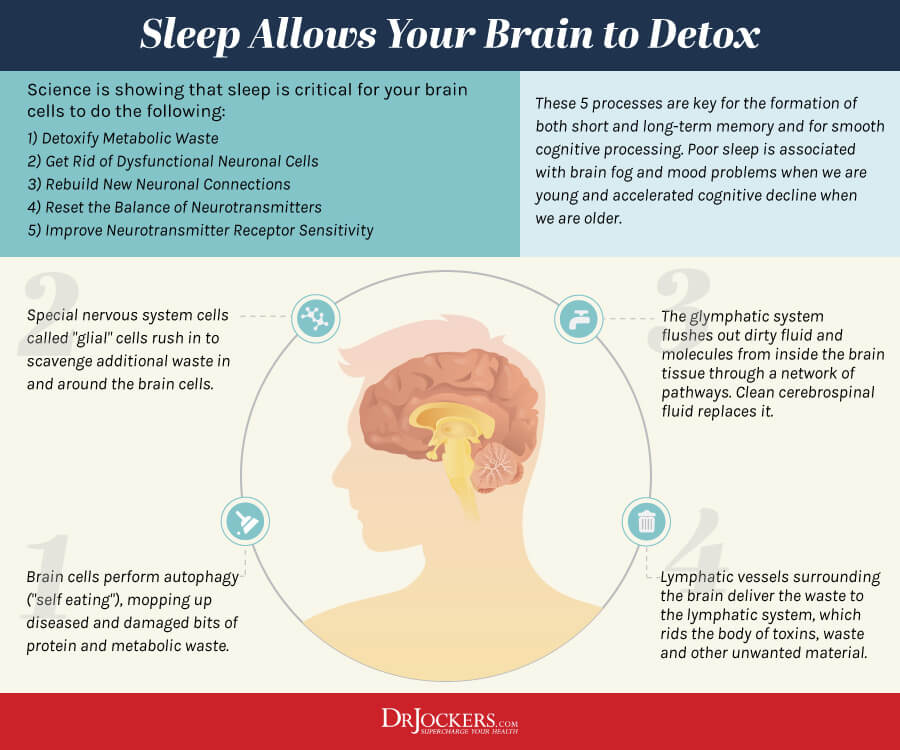
7. General Vitality
Sleep is one of the key aspects to achieving optimal health. No matter how well you eat, exercise, or supplement, quality sleep cannot be replaced in the pursuit of wellness. Along with optimal sleep comes higher energy, motivation, a boosted metabolism, and much more. The compounding benefits are huge!
This is why I have spent so much time researching and writing up on tips to getting great sleep and potential hidden causes for why many people just can’t seem to get consistent sleep. For further reading and to learn my top strategies and get to the bottom of any sleep issues you may be having, you may find it helpful start with these articles:
15 Strategies to Beat Insomnia Naturally
7 Lifestyle Strategies For Better Sleep
Sources For This Article Include:
-
Chrousos, Vgontzas, A. N., & Kritikou, I. (2000). HPA Axis and Sleep. Endotext. Retrieved from https://www.ncbi.nlm.nih.gov/pubmed/25905298
-
Ngo, H. V. V, Martinetz, T., Born, J., & Mölle, M. (2013). Auditory closed-loop stimulation of the sleep slow oscillation enhances memory. Neuron, 78(3), 545–553. PMID: 23583623
-
Payne, J. D., Tucker, M. A., Ellenbogen, J. M., Wamsley, E. J., Walker, M. P., Schacter, D. L., & Stickgold, R. (2012). Memory for semantically related and unrelated declarative information: The benefit of sleep, the cost of wake. PLoS ONE, 7(3), 1–7. PMID: 22457736
-
Magistretti, P. J., & Allaman, I. (2015). A Cellular Perspective on Brain Energy Metabolism and Functional Imaging. Neuron. PMID: 25996133
-
Volkow, N. D., Tomasi, D., Wang, G.-J., Telang, F., Fowler, J. S., Logan, J., … Ferré, S. (2012). Evidence that sleep deprivation downregulates dopamine D2R in ventral striatum in the human brain. Journal of Neuroscience, 32(19), 6711–6717. PMID: 22573693
-
Koren, D. (2016). Metabolic and Glycemic Sequelae of Sleep Disturbances in Children and Adults, 15(1), 1–17. PMID: 25398202
-
Cappuccio, F. P., Taggart, F. M., Kandala, N.-B., Currie, A., Peile, E., Stranges, S., & Miller, M. A. (2008). Meta-analysis of short sleep duration and obesity in children and adults. Sleep, 31(5), 619–26. PMID: 18517032
-
Cappuccio, F. P., Cooper, D., Delia, L., Strazzullo, P., & Miller, M. A. (2011). Sleep duration predicts cardiovascular outcomes: A systematic review and meta-analysis of prospective studies. European Heart Journal. PMID: 21300732
-
Zielinski, M., T. McKenna, J., & W. McCarley, R. (2016). Functions and Mechanisms of Sleep. AIMS Neuroscience, 3(1), 67–104. PMID: 28413828
-
Guo, C., Sun, L., Chen, X., & Zhang, D. (2013). Oxidative stress, mitochondrial damage and neurodegenerative diseases. Neural Regeneration Research, 8(21), 2003–14. PMID: 25206509
